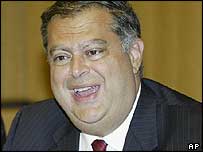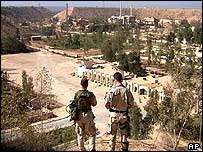- Joined
- Feb 17, 2004
- Messages
- 1,992
- Reaction score
- 1
Because of recently unearthed info. like this, I think people will reelect Bush. There's always more going on than we can know.Take a look:
<TABLE cellSpacing=0 cellPadding=0 width=629 border=0><TBODY><TR><TD colSpan=3>US reveals Iraq nuclear operation
</TD></TR><TR><TD vAlign=top width=416><!-- S BO --><!-- S IIMA --><TABLE cellSpacing=0 cellPadding=0 width=203 align=right border=0><TBODY><TR><TD>
 Abraham called the operation a "major achievement"
Abraham called the operation a "major achievement"
</TD></TR></TBODY></TABLE><!-- E IIMA -->The US has revealed that it removed more than 1.7 metric tons of radioactive material from Iraq in a secret operation last month.
"This operation was a major achievement," said US Energy Secretary Spencer Abraham in a statement.
He said it would keep "potentially dangerous nuclear materials out of the hands of terrorists".
Along with 1.77 tons of enriched uranium, about 1,000 "highly radioactive sources" were also removed.
The material was taken from a former nuclear research facility on 23 June, after being packaged by 20 experts from the US Energy Department's secret laboratories.
It was flown out of the country aboard a military plane in a joint operation with the Department of Defense, and is being stored temporarily at a DOD facility.
The United Nations nuclear watchdog - the International Atomic Energy Agency - and Iraqi officials were informed ahead of the operation, which happened ahead of the 28 June handover of sovereignty.
'Dirty bomb'?
The explosion of a so-called "dirty bomb" in a city by a terrorist group is a major concern of Western intelligence agencies.
Rather than causing a nuclear explosion, a "dirty bomb" would see radioactive material combined with a conventional explosive - probably causing widespread panic and requiring a large clean-up operation.
<!-- S IIMA --><TABLE cellSpacing=0 cellPadding=0 width=203 align=right border=0><TBODY><TR><TD>
 Iraq's biggest nuclear complex was the Tuwaitha site south of Baghdad
Iraq's biggest nuclear complex was the Tuwaitha site south of Baghdad
</TD></TR></TBODY></TABLE><!-- E IIMA -->
Uranium would not be suitable for fashioning such a device, though appropriate material may have been among the other unidentified "sources".
Mr Abraham added that the operation had also prevented the material falling into the hands "of countries that may seek to develop their own nuclear weapons".
The 1,000 "sources" evacuated in the Iraqi operation included a "huge range" of radioactive items used for medical purposes and industrial purposes, a spokesman for the Energy Department's National Nuclear Security Administration told AP news agency. Bryan Wilkes said much of the material was "in powdered form, which is easily dispersed". The IAEA has been among organisations which have warned that many countries have lost track of radioactive material.
</TD></TR></TBODY></TABLE>
Source
<TABLE cellSpacing=0 cellPadding=0 width=629 border=0><TBODY><TR><TD colSpan=3>US reveals Iraq nuclear operation
</TD></TR><TR><TD vAlign=top width=416><!-- S BO --><!-- S IIMA --><TABLE cellSpacing=0 cellPadding=0 width=203 align=right border=0><TBODY><TR><TD>

</TD></TR></TBODY></TABLE><!-- E IIMA -->The US has revealed that it removed more than 1.7 metric tons of radioactive material from Iraq in a secret operation last month.
"This operation was a major achievement," said US Energy Secretary Spencer Abraham in a statement.
He said it would keep "potentially dangerous nuclear materials out of the hands of terrorists".
Along with 1.77 tons of enriched uranium, about 1,000 "highly radioactive sources" were also removed.
The material was taken from a former nuclear research facility on 23 June, after being packaged by 20 experts from the US Energy Department's secret laboratories.
It was flown out of the country aboard a military plane in a joint operation with the Department of Defense, and is being stored temporarily at a DOD facility.
The United Nations nuclear watchdog - the International Atomic Energy Agency - and Iraqi officials were informed ahead of the operation, which happened ahead of the 28 June handover of sovereignty.
'Dirty bomb'?
The explosion of a so-called "dirty bomb" in a city by a terrorist group is a major concern of Western intelligence agencies.
Rather than causing a nuclear explosion, a "dirty bomb" would see radioactive material combined with a conventional explosive - probably causing widespread panic and requiring a large clean-up operation.
<!-- S IIMA --><TABLE cellSpacing=0 cellPadding=0 width=203 align=right border=0><TBODY><TR><TD>

</TD></TR></TBODY></TABLE><!-- E IIMA -->
Uranium would not be suitable for fashioning such a device, though appropriate material may have been among the other unidentified "sources".
Mr Abraham added that the operation had also prevented the material falling into the hands "of countries that may seek to develop their own nuclear weapons".
The 1,000 "sources" evacuated in the Iraqi operation included a "huge range" of radioactive items used for medical purposes and industrial purposes, a spokesman for the Energy Department's National Nuclear Security Administration told AP news agency. Bryan Wilkes said much of the material was "in powdered form, which is easily dispersed". The IAEA has been among organisations which have warned that many countries have lost track of radioactive material.
</TD></TR></TBODY></TABLE>
Source




